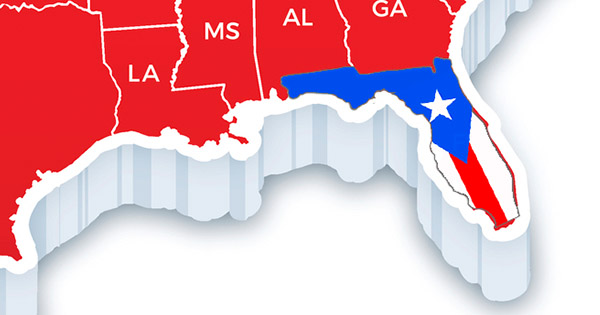
Puerto Ricans and the election of 2020 in Florida
Puerto Ricans now represent 31 percent of registered Hispanic voters in Florida, a state where Hispanics make up nearly 17 percent of all registered voters. Cubans are also at 31 percent. Most interesting is that in 1990 Puerto Ricans accounted for 25 percent of the Latino vote in the state, Cubans had a whopping 46 percent.
And the growth of Hispanic voters was double the growth rate of the entire electorate between 2014 and 2018, and 1.3 million Hispanics voted in 2018 compared to 748,000 in 2014. The voter turnout rate among Hispanics jumped from 38.1 percent of eligible Hispanic voters in 2014 to 53.7 percent in 2018.
As I’ve discussed in past columns, if Donald Trump is to repeat as president in 2020, he must first win Florida. And as reported by the Miami Herald, “Puerto Rican voters in Florida are unhappy with President Donald Trump when it comes to his actions concerning the island…” This information derived from a poll released this week by Equis Labs, a new organization which labels itself progressive and was co-founded by two former Obama administration advisers, one who hails from Miami.
The problem, according to Democrats, is that the findings do not “necessarily translate into votes for Democrats.” As reported by the Herald, “Seventy-three percent of registered Puerto Rican voters who were polled disapproved of Trump’s handling of the U.S. territory, but a smaller percentage — 67 percent — said they were ‘highly motivated’ to vote, suggesting that Democrats may need to do more work if they want to lock down Florida’s Puerto Rican vote for 2020.”
Increase of Hispanic voters
As of October of last year, and as reported by the Pew Research Center, “The number of Hispanic registered voters in Florida has increased 6.2 percent since the 2016 presidential election to a record 2.1 million people.
Hispanics now make up a record 16.4 percent of Florida’s registered voters, up from 15.7 percent in 2016. The number of Hispanic registered voters has grown more than three times as fast as the overall number of registered voters in the past two years (6.2 percent growth vs. 1.8 percent growth, as of Aug. 31, 2018).
“We believe Latinos will be the X factor,” Equis Labs co-founder Stephanie Valencia recently told NBC News.
According to the aforementioned Herald article, “The Equis Lab[s] poll of Puerto Ricans surveyed 600 registered Puerto Rican voters in Florida from Sept. 26 to Oct. 3…
“In spite of Trump’s unpopularity among Puerto Ricans, 21 percent of those polled said they would vote to re-elect Trump, while 63 percent said they would vote for the Democratic presidential candidate. Sixteen percent said they are still undecided.”
The Equis Labs poll “also looked at gender.” Forty percent of Puerto Rican men in Florida approve of Trump’s job performance, but only 24 percent of Puerto Rican women felt the same.
“There is one takeaway there that emerges in this poll: Puerto Rican women are going to be key in Florida,” said Carlos Odio, co-founder and president of Equis Labs.
“Perhaps one of the most unifying opinions revealed by the survey is the belief that discrimination against Hispanics in the U.S. has worsened since Trump took office. About 78 percent of those polled said this will motivate them to vote in the 2020 election,” reported the Miami Herald.
So here you have part of the equation that must be solved to win the presidential election in Florida. Will Puerto Ricans be the reason Trump loses the state of Florida and therefore the election in 2020? With their numbers continuing to grow — it is estimated that between 30,000 and 50,000 Puerto Ricans moved to Florida after Hurricane Maria — will they participate en masse next year?
As Fernand Amandi, a Miami pollster who studies the Latino vote, explained to the Miami Herald, Puerto Ricans have “shown to be a swing voter constituency. They don’t vote homogeneously.” In other words, Democrats should not take them for granted (as they’ve had in the past).
Amandi said an estimated 350,000 Puerto Ricans are registered to vote in Florida. About 180,000 of them are registered Democrats and over 70,000 of them are registered Republicans. An estimated 120,000 are not affiliated to any party.
No Party affiliated voters, as I’ve discussed in the past, are key to this election. Also an important factor will be who the Democrats nominate to represent them; and if that person has the capacity to get out his or her voters.
In a little over 12 months we should have the answers.


